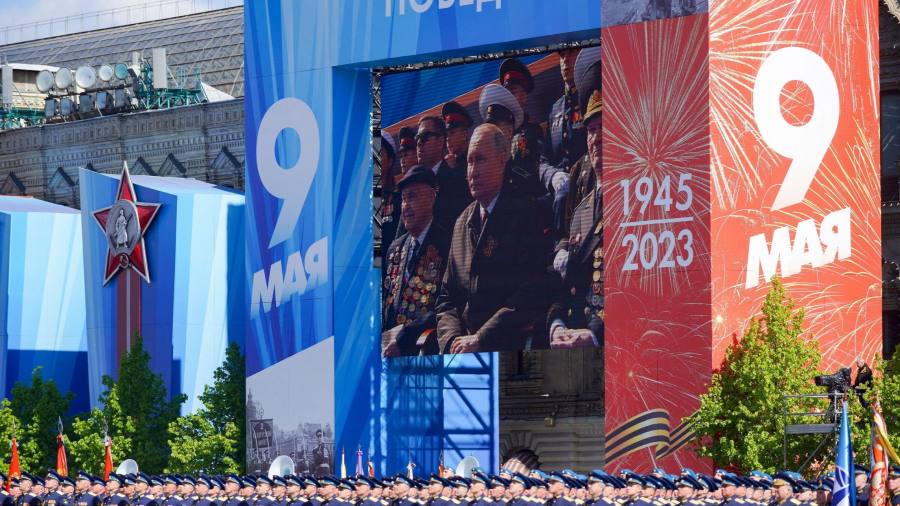President Vladimir Putin has vowed to pursue his war in Ukraine, accusing western nations of seeking to dismember Russia as his forces launched more missile attacks on Kyiv.
Speaking at a noticeably scaled-back military parade to celebrate the Soviet Union’s victory in the second world war, Putin claimed that “a real war has once again been unleashed against our motherland”. The goal of this, he said, was to “achieve the disintegration and destruction of our country”.
The modest festivities on Tuesday took place ahead of an expected counteroffensive by Kyiv and amid security concerns following a string of drone attacks deep inside Russia.
The Red Square parade took place hours after renewed air strikes were launched against Kyiv and other cities in Ukraine, which were described by President Volodymyr Zelenskyy as an attempt by Moscow to show some military successes in its faltering full-scale invasion.
“Russia . . . needs to sell something to their society,” Zelenskyy said during a joint news conference with European Commission president Ursula von der Leyen. “They were not able to sell Bakhmut to their society because they were not able to capture Bakhmut,” Zelenskyy added, referring to the bombed-out city in eastern Ukraine that Russia’s forces have unsuccessfully tried to capture for about nine months.
On Tuesday morning, Russia fired 25 cruise missiles at Ukrainian cities, most of which were intercepted. Explosions also rocked Kyiv on Monday as Russia sent its largest swarm of attack drones to target Ukraine’s capital. With many predicting that a counteroffensive would focus on Russian-occupied territories in Ukraine’s south-east, Russia last week began a partial evacuation of civilians from some frontline areas in the region.
Ukrainian officials said 23 of the missiles were intercepted. The country has recently benefited from modern Nato-grade anti-missile defences able to intercept Russia’s most advanced rockets, with the US on Tuesday announcing additional assistance, including more air defence systems and ammunition.
Von der Leyen, who arrived in Kyiv by train shortly after the missile strikes, described Ukraine as “the beating heart of today’s European values”, adding that “in Russia, Putin and his regime have destroyed these values, and now they are attempting to destroy them here in Ukraine”.
“But the aggressor has already dramatically failed. Ukraine has resisted the attack. And is fighting back successfully,” von der Leyen added. She said it was “very fitting” to celebrate Europe Day in Kyiv, particularly since Ukraine had changed its holiday to celebrate Europe Day on May 9, in line with other EU countries.
French president Emmanuel Macron also signalled support for Kyiv, writing on Twitter that “today, with our help, Ukraine continues to resist and, on the strength of its own courage, will emerge victorious”.
In his brief speech, Putin continued to describe the invasion of Ukraine as a “special military operation”, a term intended to create the sense that the battle would be swift and limited in scope. But he also for the first time referred to the conflict as the “people’s war”.
The Moscow parade was notably shorter than in previous years, analysts said.
“Most of the equipment they typically roll through the square was not on display,” said Michael Kofman, director of the Russia studies programme at the Center for Naval Analyses, a Washington-based think-tank. “I think they cut most of the parade short to avoid the risk, and the time during which leadership would be exposed.”
Samuel Bendett, an adviser at that same think-tank, said on Twitter that the “obvious absence of so many vehicles and systems indicated a nation under stress . . . that almost rushed through one of its key holiday celebrations”.
In the Russian city of Belgorod, near the Ukrainian border, authorities said they had cancelled the parade to avoid creating a possible target by gathering “a large amount of equipment and soldiers” in the centre of the city. Authorities in Crimea, which Russia annexed from Ukraine in 2014, also cited “security concerns” when scrapping this year’s Victory Day events.
Ordinary Russians were especially conscious of the wartime changes as authorities cancelled the traditional people’s parade — known as the Immortal Regiment — that takes place following the military parades on the day.
Still, foreign leaders participating in the Russian event were more numerous than in other years: the presidents of Uzbekistan, Belarus, Kazakhstan, Kyrgyzstan and Tajikistan, and the prime minister of Armenia all travelled to Moscow for the occasion. No foreign leader attended the Victory Day parade last year, which took place just two months after the start of the full-scale invasion, and only one leader attended the year before.
Additional reporting by Felicia Schwartz in Washington
Read the full article here




